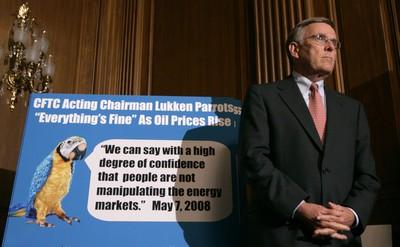House OKs extended jobless pay
WASHINGTON -- After failing in its first attempt, the House passed a bill last week to extend unemployment benefits.
The legislation, which passed on a 274-137 vote, would make the jobless eligible for benefits for 13 weeks beyond the 26 weeks already allowed for all states.
On its first attempt, the House voted 279-144 for the extension. That was three votes shy of a two-thirds majority, which was required because the extension came to the House floor under an expedited procedure.
Advocates of the extension cited the surging unemployment rate of 5.5 percent, and said unemployed workers desperately need money to look for a job and meet other financial obligations.
President Bush has argued the best way to help the unemployed would be to create "an environment that encourages job creation and to promote effective job training."
Reps. Shelley Berkley, D-Nev., and Jon Porter, R-Nev., voted both times to extend unemployment benefits.
Rep. Dean Heller, R-Nev., voted both times against the extension.
OIL COMPANY TAX REBUFFED
The Senate voted 51-43 to approve a tax on oil company profits, but the measure failed because 60 votes were required under Senate rules.
In addition to taxing profits that are more than 10 percent higher than a past average, the legislation would have rolled back about $17 billion in tax breaks for oil companies.
Supporters of the tax said oil companies should not be enjoying tax breaks and record profits when Americans are struggling to pay an average of $4 per gallon for gasoline.
Critics charged the tax would increase the cost of gasoline and ignore the need for domestic oil production in areas like the Arctic National Wildlife Refuge.
Sen. John Ensign, R-Nev., voted against taxing the oil companies.
Sen. Harry Reid, D-Nev., supported taxing the oil companies but voted no to preserve his authority as majority leader to call the bill up for another vote.
MEDICARE BILL BLOCKED
Doctors face a 10.6 percent cut in Medicare payments and may refuse to see new patients unless Congress reaches a compromise by July 1.
The Senate voted 54-39 for a bill proposed by Democrats to prevent the pay cut for physicians, but 60 votes were required to end the debate.
The bill calls for spending $19.8 billion over five years, but Democrats and Republicans disagree on how to pay for it.
Democrats want to slash privately run Medicare Advantage programs, which offer more benefits at a lower cost but also are costlier for the government to reimburse.
A Republican alternative bill would have cut Medicaid, the health entitlement program for the poor.
Ensign voted against the Democratic version of the Medicare bill.
Reid supported the Democratic version of the Medicare bill but voted no to preserve his authority as majority leader to call the bill up for another vote.
TAX BREAKS STALLED
Despite receiving a 50-44 vote, a bill extending a variety of tax breaks, including a deduction for state sales taxes, stalled in the Senate.
Sixty votes were needed to advance the $55.5 billion bill, which includes new tax policies to help low-income families.
Supporters said the bill would provide much-needed tax relief to Americans struggling with skyrocketing gasoline prices and mortgage foreclosures.
Opponents complained about offsets in the bill that would pay for the tax breaks. They charged the offsets would result in tax increases on other Americans.
Ensign voted against extending the tax breaks.
Reid voted for the extension.
AMTRAK FUNDING APPROVED
Defying a veto threat, the House voted 311-104 to spend $14.4 billion to maintain the Amtrak passenger train service for five years.
The bill would require the identification of Amtrak's two least successful rail lines so private companies could take control of them.
Amtrak backers said trains remove 8 million cars from the highways each year, and eliminate the need for 50,000 fully loaded airline flights.
President Bush has threatened to veto the bill because it does not include "meaningful reforms in Amtrak's governance or operations."
Berkley voted for Amtrak funding.
Heller and Porter voted against Amtrak funding.

















